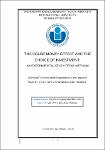| dc.description.abstract | This study uses the software approach in order to create an experimental
market where participants’ investment data is collected. We then used this data to
prove the relationship between the House Money Effect and several well-known
behavioral theories. We found out that there is a strong influence of the Prospect
Theory, and a weak influence of windfall gains on the House Money Effect. Sunk
costs and mental accounting does not seem to contribute to the occurrence of the
House Money Effect.
We have examined whether individuals with certain personal traits will be
more exposed to the House Money Effect: Age, gender, and investing experience all
have a relationship with the frequency of the House Money Effect. Breadwinners
experience the House Money Effect more often than the others. There is an unclear
relationship between family size and the House Money Effect, and there is no
connection found between income levels with the House Money Effect.
Through this study, we hope to contribute to the society by encouraging
policy makers to increase financial education among Vietnamese, and to revise their
decisions based on better understanding of Vietnamese investors. We believe to have
also contributed to academia by endorsing the use of software simulations.
Keywords: House Money Effect, Prospect Theory, Theory of windfall
gains, personal traits, software simulation. | en_US |


